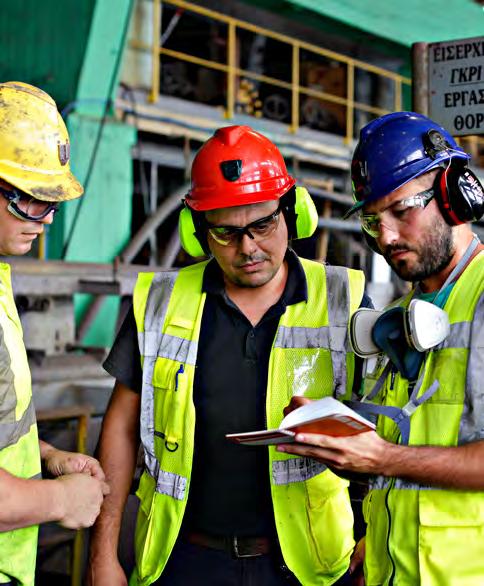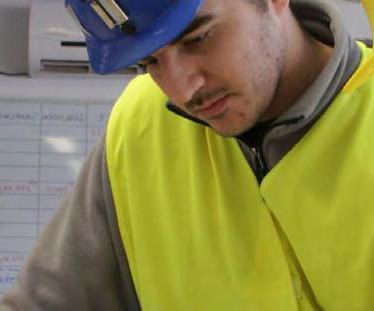6 minute read
4. Responsible Sourcing
100%
of gold and gold-bearing materials produced do not cause, support or benefit unlawful armed conflicts or contribute to serious human rights abuses
100%
of products with communicated safety data sheets and declarations on product hazards
0
proved or probable reserves in or near active conflict areas
We do not sell our products to the public and sell directly to our customers (i.e. smelters, traders, agents), who have been acquired through customer intelligence and market references. Since all products are sold in bulk to downstream refineries for secondary treatment, they do not require packaging or product labeling and information. Furthermore, we:
4 | Responsible Sourcing
Our objective is to improve our supply chain through systematic supplier and contractor management, as well as utilize existing transportation networks and transit stations around our projects to transport our products, in order to increase operational efficiency and reduce high stocks in our warehouses. Being aware of the obligations we have due to our size and nature of activities, we cooperate with our suppliers to deploy Corporate Responsibility within our value chain. • Follow the precautionary approach for all our road and marine shipments from Olympias and Stratoni (even zinc concentrates) and all our shipments are characterized as hazardous (i.e. as including substances such as arsenic), and are therefore conducted under the European
Agreement Concerning the International Carriage of
Dangerous Goods by Road and International Maritime
Organization (IMO) regulations while shipped from our production sites to smelters • Exclusively hire subcontractors certified and trained to follow the standards and procedures relevant to the aforementioned guidelines regarding product transportation with respect to emergency response and security • Closely monitor our product shipments until final arrival to customers, in order to ensure safe delivery • Follow national purity limits, as for example with lead and zinc concentrates, which have higher arsenic content than the respective Chinese import limit, and are therefore sold to non-Chinese markets or to blending facilities in bonded areas at Chinese ports • Do not undertake product recycling (no products are reclaimed), as all our metal products are sold to downstream refiners for further processing.
Did you Know?
Ecological Backpack of Products and Metals
An Ecological Backpack looks at hidden material flows and is calculated as the total quantity (in kg) of materials moved from nature to create a product or service, minus the actual weight of the product. The ecological backpack of some materials changes over time as they become rarer or as technology makes extraction or processing more efficient. For example, copper has moved from an ecological backpack of 1:1 when copper nuggets were easy to find to 500:1 when copper is extracted from sulphide ores. Other products have a much higher ecological backpack than expected because of their production complexity. For example: • A 5 gram gold ring was found to have an ecological backpack of 2,000 kg • An aluminum drink can was found to have an ecological backpack of 1.2 kg • A 20 kg computer was found to have an ecological backpack of 1,500 kg.
Source: Wuppertal Institute for Climate, Environment and Energy
Influencing our supply chain
We fully acknowledge that our suppliers’ activities can influence our own responsible operation and therefore include our Contractor Safety Rules in all tender notices, which also constitute a key section in all contracts. All our contractors and suppliers have to comply with the MACTSM Prevention of Child and Forced Labour Verification
Protocol and the International Labour Organization conventions on forced labour and modern slavery. Being committed to protect the human rights in our supply chain, we aim to apply international good practices in our business activities and seriously consider the respective track record of collaborating companies. Furthermore, we: • Require from all suppliers and contractors to comply with all applicable anti-corruption laws and our Policies published in our website: www.hellas-gold.com/ellinikosxrysos/company-policies#en (e.g. Anti-Bribery and Anti-
Corruption Policy, Human Rights Policy, Environmental and
Energy Policy, Health and Safety Policy) before they begin their work with us • Consider acceptance of the Purchase Order as an acceptance of the aforementioned legislation and policies • Consider any violation of our policies or regulations as a violation of the Purchase Order terms and reserve the right to terminate collaboration immediately. Supplier assessment: Within 2020, we evaluated all our contractors/service providers (who represent approximately 75% of our procurement spending) and suppliers of goods, which include suppliers with the highest procurement spending, as well as in terms of important groups of goods we purchase (e.g. safety equipment). We conduct our supplier evaluation process based on the following criteria: • Pricing • Previous record of performance and services • Locality • Quality delivery and conformance to specifications • Provision of satisfactory services.
0
existing suppliers with collaboration discontinued due to ethics, environmental or quality issues
Choosing suppliers objectively
Since 2015, we have established a Contractor Management System to systematically manage the contractor evaluation process, which begins when contractors submit a project quote or participation to a tender, in order for the vendor to be included in the selection process, as mandatory requirements during the procurement process, which include: • Environmental stewardship • Health and safety • Labor practices • Human rights. We consider failure of our suppliers to comply and prove their compliance on the respective issues as a reason for automatic exclusion from any potential future collaboration. So far, we have not identified any suppliers with significant: • Actual or potential negative environmental, labor practices, human rights impacts or impacts on society • Risk for incidents of child labor or forced and compulsory labor or suppliers whose employees’ rights regarding freedom of association and collective bargaining may be violated. Bids and bids evaluation: We aim to be transparent in our procurement practices and therefore: • Require a minimum number of bids depending on the value of purchase (e.g. at least four bids for purchases between €20,000 and €50,000 and at least five bids for purchases over €50,000), except in cases of single source suppliers • Conduct Health and Safety Evaluation in parallel with bidders’ Technical Evaluation, as well as Environmental
Evaluation, when required • Require from contractors to submit a Risk Assessment plan for the job to be conducted. Assessing Contractors: Upon completion of assigned work, all our contractors are evaluated according to the following criteria, each with a specific weighting.
CONTRACTOR ASSESSMENT
Criteria Compliance with Health and Safety and Environmental Standards and Laws Contract Execution and Work Performance Quality of Executed Work / Compliance with Contract Standards and Specifications
Organization and Administration of Contract Execution Weighting
20%
30%
30%
20%
Supporting our suppliers
We keep our contractual obligations regarding payments to suppliers, with the average payment time being 60 days. Furthermore, support our suppliers in their capacity to work with us, and train our contractors on health, safety, environmental management and governance, before project initiation and regularly throughout the year, in order to contribute to their know-how and ability to undertake demanding projects. During 2020, we conducted obligatory trainings to contractors and service providers on Health and Safety, Environment, Human Resources and COVID-19 protection measures.
75%
of supplier payments conducted according to contractual obligations
90 days maximum payment time for suppliers 100%







